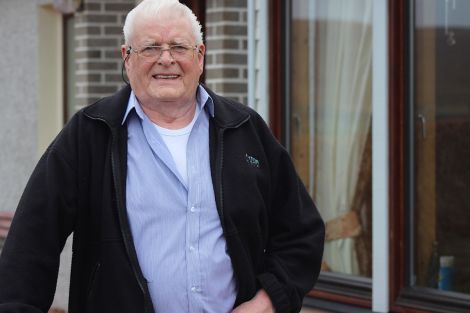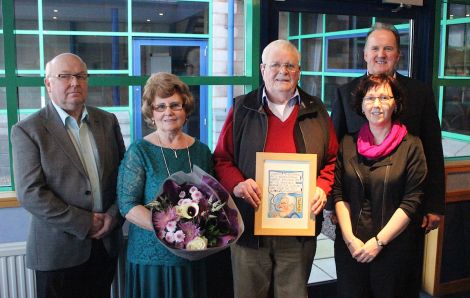Features / Fifty years at the forefront of fishing
“I have always had the greatest admiration for the men who do one of the hardest job there is on the planet,” says Ertie Nicolson on the eve of his retirement at the tender age of 75.
Nicolson has served the fishing industry for an incredible 53 years during which these islands have completely transformed from a place with few prospects to North Sea boom town.
Two weeks ago he and his wife Margaret attended a small retirement ceremony at the NAFC Marine Centre, where he has served as chairman for the last four years.
Admired and feared in equal measure for being unafraid to speak his mind, Nicolson is a great interviewee.
Aside from many other (occasionally unprintable) issues we touched on during a two hour chat, he is critical of Shetland Islands Council’s record of wasting its oil funds and the ongoing attempt to amalgamate the NAFC with Shetland College.
The SIC’s policy of handing out generous grants to industry during the buoyant years of the ’80s and ’90s were disastrous, he believes, whereas low interest loans would have helped both sides.
“Even though I benefited from the grants, I maintain it should have been loans to industry,” he says.
Born in Swinister, near Mossbank, in 1940, he left school at the age of 15 and after a short stint at a local tweed mill he joined the Merchant Navy.
He was working on a heavy lift ship delivering equipment to Christmas Island and witnessed the British atomic bomb test there in 1957 – “we saw the bomb going off – it was eerie, and of course there was no protection at all” – and found himself caught up in the Cuban missile crisis of October 1962 when the ship he was working on was intercepted by the Soviets.
Become a member of Shetland News
Safely back ashore in Shetland a few months later to get married, he started his long association with the local fishing industry. His first job was at the Iceatlantic fish factory in Scalloway, where he soon became manager.
It was a time when the local fishing industry was recovering from a long period of depression and was slowly beginning to invest in new boats as whitefish stocks recovered.
“At that time there were no jobs in the islands and the only jobs outside were the merchant navy and whaling, but in the ’60s there was an upturn in the fishing industry so we were able to keep a lot of our younger people here in Shetland,” he recalls.
Soon a number of new white fish processing factories sprang up at Northmavine, Burra, Skerries and Arlanda, in Lerwick. Ertie Nicolson along with industry veteran Gibbie Johnson was involved in all of them.
“I’ve had many opportunities to work in the oil industry, but I’ve always turned them down. I believe in the fishing industry, it is the backbone of these islands,” he says.
His next move was into quality control to ensure fishermen received a better price for the product they brought ashore: “We had good quality fish but they way the fish was handled was poor.”
There followed many years as fisheries development officer with Shetland Islands Council, where he helped tighten up the works licence regime for fish farms competing for space with the rapidly growing mussel growing sector.
He remembers it as a time when licenses were granted without any checks being made to find out if conditions were being adhered to.
“The whole system was tidied up – there have to be laws out there, the sea belongs to everybody, it does not belong to the salmon farmer.”
He first retired in 2007 only to be brought back four years later to fight the NAFC’s corner in the tertiary education review.
The SIC aims to merge Shetland College, Train Shetland and the NAFC Marine Centre into one institution in a bid to save money, a move that is vehemently opposed by managers of the Scalloway fisheries college.
Nicolson is the first to admit that the NAFC has suffered from a poor reputation locally, but he insists that is unfair and points out that nationally and internationally the college punches well above its weight.
Over the years it has trained hundreds of people who now work in the maritime sector around the world, either as seafarers, fish farmers or scientists.
The college works closely with ICES, the International Council for the Exploration of the Seas, on stock assessments and regularly attracts European research projects.
He says that even though some of the NAFC’s funding comes from the University of the Highlands and Islands (UHI), comparing it to Shetland College is like comparing “chalk and cheese”.
His answer to how the NAFC can stand on its own financial feet is: “Very simple”:
- the various sectors of the local seafood industry appear to be willing to contribute towards its running costs, and discussions are ongoing;
- there is a consensus that the Crown Estate levy, if devolved to Shetland, should aid the local fishing and aquaculture industries;
- the whitefish levy – a charge paid to industry body Seafish on all fish landed – should remain in the isles.
There is a lot to get on with. The NAFC’s board of trustees has just appointed two joint chairmen to follow in Ertie Nicolson’s footsteps.
QA Fish managing director and former college principal Gordon Johnson will handle the practical side, while the politics will be dealt with by SIC councillor David Sandison, who manages the Shetland office of the Scottish Salmon Producers’ Organisation.
Final word to Ertie: “Yes, there is optimism in the industry, something we can build on”; and: “No, I’m not standing for council.”
Become a member of Shetland News
Shetland News is asking its many readers to consider paying for membership to get additional features and services: -
- Remove non-local ads;
- Bookmark posts to read later;
- Exclusive curated weekly newsletter;
- Hide membership messages;
- Comments open for discussion.
If you appreciate what we do and feel strongly about impartial local journalism, then please become a member of Shetland News by either making a single payment, or setting up a monthly, quarterly or yearly subscription.































































